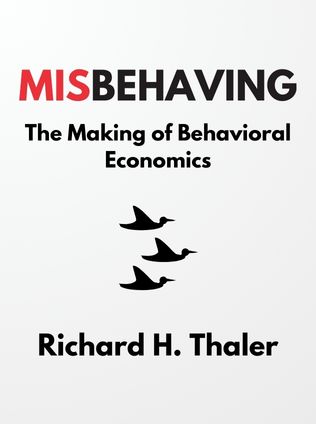
Misbehaving
The Making of Behavioral Economics
By Richard H. Thaler
Published 12/2013
About the Author
Richard H. Thaler is a pioneering figure in the field of behavioral economics, a discipline that merges psychology with economics to better understand how people make decisions. His groundbreaking work has earned him the 2017 Nobel Prize in Economic Sciences, a recognition that underscores his significant contributions to the field. Thaler's work primarily challenges the traditional economic theory, which is based on the assumption that individuals act rationally to maximize their utility. Through his research, Thaler has demonstrated that human behavior often deviates from these rational models, leading to decisions that are inconsistent with traditional economic predictions.
Thaler’s journey into behavioral economics began when he noticed anomalies in people's economic behavior that could not be explained by existing theories. These anomalies, or as he refers to them, “misbehaviors,” led him to question the core assumptions of traditional economics. Over the years, Thaler has authored several influential books, including Nudge and Misbehaving. Misbehaving, in particular, chronicles his journey and the development of behavioral economics, offering insights into how and why people make seemingly irrational decisions. His work has had a profound impact not only on academic economics but also on public policy and business practices worldwide.
Main Idea
Misbehaving is both a personal narrative and an academic exploration that challenges the foundational principles of traditional economics. The book argues that humans are not always rational actors and that their decisions are often influenced by psychological biases and social factors. Thaler provides a wealth of evidence to support his claim, drawing from decades of research and real-world examples. He argues that by acknowledging and understanding these "misbehaviors," we can develop better economic models and policies that more accurately reflect human behavior.
The book is divided into several parts, each addressing different aspects of behavioral economics. Thaler begins by examining the shortcomings of traditional economic theories, particularly the concepts of constrained optimization and the efficient market hypothesis. He then delves into various behavioral anomalies, such as mental accounting, the endowment effect, and present bias, which illustrate how real people often deviate from the rational actor model. Finally, Thaler discusses the practical applications of behavioral economics, particularly through the concept of "nudging," which involves designing choices in a way that guides people toward better decisions without restricting their freedom.
Table of Contents
- The Foundations of Traditional Economics
- Arguments Against the Premise of Constrained Optimization
- Arguments Against the Efficient Market Hypothesis
- Real-World Applications of Behavioral Economics
- Conclusion: The Impact of Behavioral Economics
The Foundations of Traditional Economics
Traditional economic theory is built on the premise that individuals are rational actors who make decisions to maximize their utility within the constraints of their budget. This theory is known as the premise of constrained optimization. According to this theory, consumers are expected to weigh all available information and make choices that offer them the greatest benefit at the lowest cost. For example, when shopping for groceries, a rational consumer would compare the prices and qualities of different products and choose the one that offers the best value for their money.
Another cornerstone of traditional economics is the efficient market hypothesis (EMH), which posits that financial markets are perfectly efficient. This means that all available information is already reflected in the prices of securities, making it impossible to consistently achieve returns that exceed the market average. According to the EMH, any anomalies in the market are quickly corrected by the actions of rational investors, ensuring that prices always reflect the true value of the underlying assets.
However, Thaler argues that these theories are overly simplistic and fail to account for the complexities of human behavior. He points out that people are not always rational and that their decisions are often influenced by cognitive biases, emotions, and social factors. These factors can lead to systematic deviations from the predictions of traditional economic models, resulting in what Thaler terms "misbehaving."
Sign up for FREE and get access to 1,400+ books summaries.
You May Also Like
The Subtle Art of Not Giving a F*ck
A Counterintuitive Approach to Living a Good Life
By Mark MansonRich Dad Poor Dad
What the Rich Teach Their Kids About Money - That the Poor and Middle Class Do Not!
By Robert T. KiyosakiHow To Win Friends and Influence People
The All-Time Classic Manual Of People Skills
By Dale CarnegieFreakonomics
A Rogue Economist Explores the Hidden Side of Everything
By Steven D. Levitt and Stephen J. Dubner



















